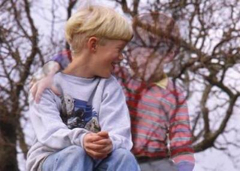A study of of 48 boys and girls aged 5-1/2, found that the 13 girls and 10 boys who currently or previously engaged in imaginary companion play had more advanced narrative skills than children who did not engage in this type of play, reports ScienceAlert:
Children’s interaction with imaginary friends appears to play a positive role in their language development, according to new research that adds to the growing body of evidence that having such companions can be developmentally beneficial.
Associate Professor Elaine Reese of the University of Otago, New Zealand and her former Clark University student Dr. Gabriel Trionfi conducted the research, which appears in the academic journal Child Development .
.
Well, phooey. I did not have an imaginary friend. My sister Robin did. Her friend’s name was Giffen. It evolved that Giffen lived on the route between our farm and the home of my childhood best friend, Claudia. When my mother would drive me to Claudia’s or pick me up, Robin would always point out Giffen’s house.
Neither of my children had imaginary friends, but my son John had an “old family” with whom he said he had lived before he came to be our child. His memories of his old family were quite vivid and detailed — to the point where I actually wondered if he was recalling a past life. Apparently his old family had been killed in a bomb explosion, and he could get himself into quite an emotional state recalling their demise.
Researcher Reese notes that “because children’s storytelling skills are a strong predictor of their later reading skill, these differences may even have positive spinoffs for children’s academic performance.” Interestingly, both my sister and my son are brilliant. Robin was an early reader, and John became a voracious reader.
Another interesting study — and one might exist — would look at why some children have imaginary friends and some don’t.
Did you have an imaginary friend? Did you become a good storyteller and/or learner as a result?
